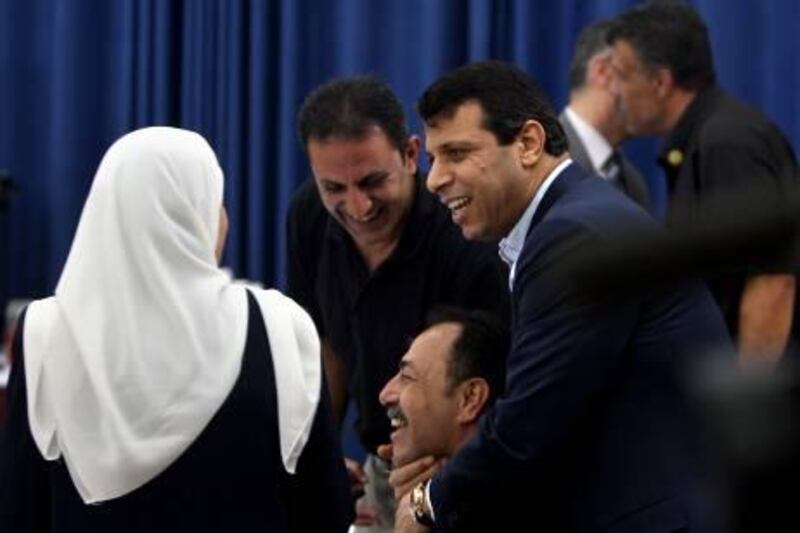JERUSALEM // Mohammad Dahlan, once widely regarded as the heir apparent to Yasser Arafat as Palestinian president, has been barred from Fatah Central Committee meetings while an investigation looks into allegations of "subversion".
The committee issued a statement on Tuesday saying it had decided "unanimously to suspend Mohammed Dahlan from its meetings until the commission of inquiry finishes its work".
The move, made during a gathering of the committee in Ramallah, appeared to confirm months of speculation that Mr Dahlan, 49, had fallen out with Fatah and its leader, Mahmoud Abbas, the Palestinian Authority (PA) president.
While Palestinian officials refused to specify the nature of the inquiry, it is thought that the committee will investigate the source of Mr Dahlan's considerable wealth and his alleged efforts to amass power within Fatah.
An anonymous committee member said that the investigation would look into Mr Dahlan's "subversion against president Abbas and members of the committee".
For months, rumours have swirled that he has been criticising Mr Abbas and his family's business dealings, and attempting to pressure the Palestinian leader from power.
In an unconfirmed report earlier this month, the Israeli daily Haaretz reported that Mr Dahlan, who has enjoyed enormous popularity among younger Fatah members, also secretly sought to form his own militia.
Adnan Domeiri, the spokesman for the PA's security forces, would not confirm this account. "I haven't any information about this," he said.
But officials close to Mr Dahlan are reported to have been arrested in recent weeks. Yusef Issa Yakub, an ally of Mr Dahlan who was the PA's deputy head of the authority's preventive security force, was recently removed from his position.
Palestinian observers have suspected the alleged activities as Mr Dahlan's jockeying for more power at a time when stalled peace negotiations with Israel have tested the leadership of Mr Abbas and the PA.
The Palestinian president reportedly stripped him of his bodyguards recently and threatened him with imprisonment. Earlier this month, the PA shut down a television station connected with Mr Dahlan, reportedly over a failure to pay licensing fees.
Following committee's meeting in Ramallah - presided over by Mr Abbas - Mr Dahlan was also stripped of his title as Fatah's media commissioner and removed from the group's information and culture commission.
"He's ambitious and he sought to create his own centre of power within Fatah, and there was a feeling of threat among Abbas and other leaders in the group," said George Giacaman, a Palestinian analyst and co-founder of the Palestinian Institute for the Study of Democracy.
"He openly criticised them, and people thought this was too much. Some felt it could be an insurrection in the making within Fatah."
Mr Dahlan denied the allegations, calling them "false and malicious information".
Even so, the punishments would seem to have been another blow to the ambitions of a man who was born into desperate poverty in the Gaza Strip's Khan Younis refugee camp, the youngest of six children, and rose to become the most powerful man in Gaza and easily one of its richest, as well as ingratiating himself to the United States.
Yet while receiving a political boost last year from his election to the central committee, Mr Dahlan has never been able to shake his reputation as the man who lost Gaza to Hamas in 2007, when he led a failed coup, reportedly backed by the CIA, against the Hamas-led government there.
His forces suffered a humiliating defeat during the street fighting and his house in Gaza City was burnt to the ground by members of the Islamist movement, who despised him for the repressive tactics he and his forces had used against them while in power.
Still, while receiving yet another political blow this week, it is not certain whether his political career has ended. "It depends how far they take it," Mr Giacaman said of the central committee's investigation.
"It could be a disciplinary measure designed to have him toe the line, or they could take it a step further and expel him, though I doubt they'd take it so far. I think it's more about clipping his wings."





